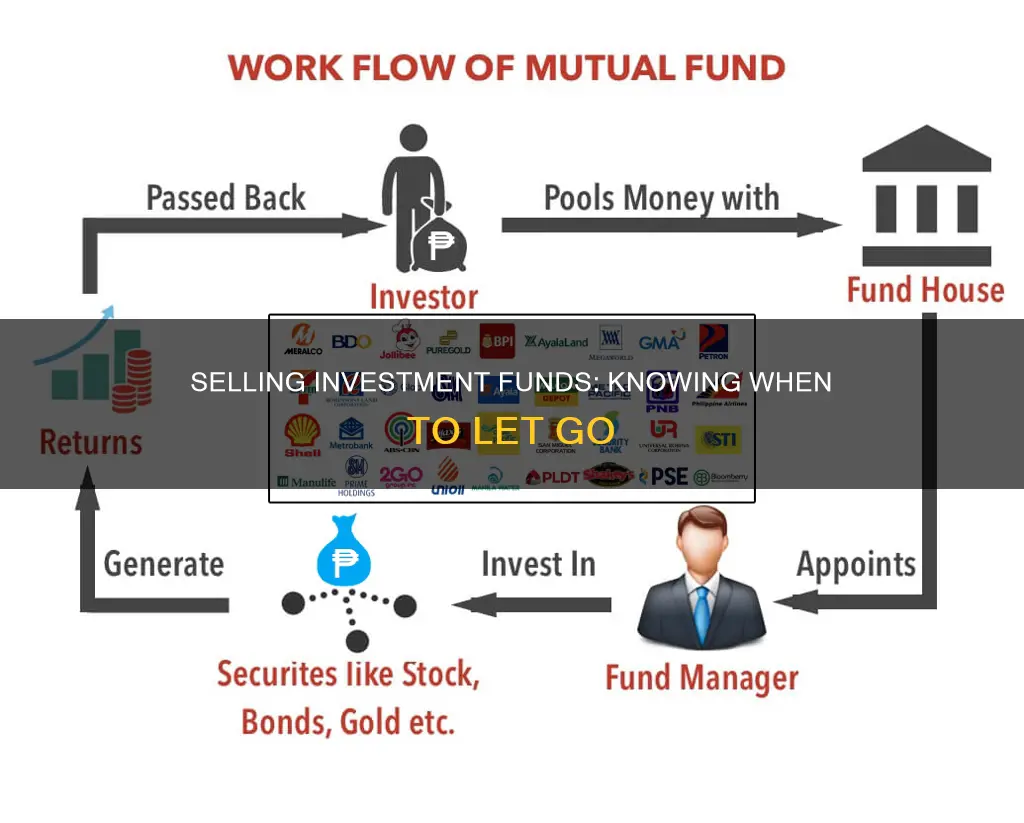
Knowing when to sell an investment is just as important as knowing when to buy one. However, there is much less guidance available on this topic for private investors. Investors must consider several factors before selling an investment, including their risk tolerance, time horizon, and financial goals.
- To adjust your portfolio: You may need to sell a fund to rebalance your portfolio, especially if it has become unbalanced or inappropriate for your investing goals. For example, if you have too much exposure to a particular sector or risk level.
- Underperformance: If a fund is underperforming and not meeting your expectations, it may be a good idea to sell it. This could be due to poor fund management, a change in strategy, or a shift in the market.
- Changes in fundamentals: If something fundamental has changed about the company or fund, such as a change in management, a scandal, or a profit warning, it may be a good idea to sell.
- Tax purposes: While not the primary reason, tax implications can play a role in your decision to sell an investment. Consult a tax professional to understand the tax consequences of selling an investment fund.
- Cash needs: If you need cash for a down payment, medical expenses, or other financial obligations, selling an investment fund may be necessary to free up money.
- Change in ownership or merger: A change in ownership or a merger could be a reason to sell an investment fund, especially if the new ownership or merger does not align with your investment strategy.
It's important to have a well-defined investment strategy and avoid making impulsive decisions based on short-term market fluctuations or emotional reactions. Consult a financial professional if you need help building an investment plan that aligns with your financial goals and risk tolerance.
| Characteristics | Values |
|---|---|
| Time of ownership | If you have owned the stock for a long time, it may be a good time to sell and take your profit. |
| Performance | If the fund is underperforming, it may be a good time to sell. |
| Portfolio balance | If the stock is over-represented in your portfolio, you may want to sell to rebalance. |
| Cash needs | If you need cash for a large purchase or to cover living expenses, selling stocks can be a good idea. |
| Investment thesis | If your original reason for buying the stock no longer applies, it may be time to sell. |
| Company acquisition | If the company is being acquired, the stock price will likely rise and then plateau, so it may be wise to sell and lock in your gains. |
| Portfolio rebalancing | If your portfolio has become unbalanced, you may need to sell some stocks to address this. |
| Better investment opportunities | If you identify more attractive investment opportunities, selling stocks to free up capital can be a good idea. |
| Tax purposes | In some cases, selling stocks can help save money on taxes by offsetting capital gains. |
What You'll Learn

When the fund is underperforming
- Time Horizon: Recognize that funds may experience bouts of underperformance, and consider whether the underperformance is short-term or persistent over a longer period. Give the fund some time to turn its performance around, especially if you believe in the fund's management and strategy.
- Fundamentals and Market Conditions: Evaluate the fundamentals of the fund, including financial health, business model, industry challenges, and management issues. Consider if there have been any changes or deterioration in these areas. Also, assess the broader market conditions and how they might be impacting the fund's performance.
- Investment Strategy: Ensure that the fund still aligns with your overall investment strategy and risk tolerance. If the fund no longer fits your goals and comfort level, it may be time to consider selling.
- Opportunity Cost: Holding onto an underperforming fund may hinder your ability to invest in more promising opportunities. Consider if there are alternative investments that better suit your goals and have higher growth potential.
- Tax Implications: Consult with a tax professional to understand the tax implications of selling the fund. In some cases, selling a losing position can help offset capital gains and reduce your overall tax liability.
- Emotional Capital: Be cautious of investing your emotional capital in the holding decision. It's important to make rational and objective decisions based on the fund's performance and your investment strategy rather than emotional attachment or hope.
- Expert Opinion: If you're unsure, consider seeking advice from a financial advisor or investment professional. They can provide tailored guidance based on your specific circumstances and help you navigate market fluctuations and tax considerations.
Index Funds: Utopia or Dystopia for Investors?
You may want to see also

When the fund's strategy changes
When a fund's strategy changes, it can be a tricky situation to navigate as an investor. Here are some detailed guidelines on when to sell investment funds in such a scenario:
- Change in Fund Manager: A change in fund manager can be a red flag, indicating a potential shift in the fund's strategy. Pay close attention to the fund's performance and the new manager's experience. If the fund's goals remain the same, it may be wise to monitor its returns for a period before making a decision.
- Deviation from Original Mandate: If the fund deviates from its stated mandate and takes on undue risks, it may be prudent to exit the investment. For example, if a fund takes on high-credit-risk bonds to generate higher returns, it could lead to challenges in managing redemption requests during volatile market conditions.
- Underperformance: Consistent underperformance over an extended period, such as two or more years, could be a sign to sell. Compare the fund's performance to suitable benchmarks or similar funds to make an informed decision.
- Change in Investment Strategy: If the fund's investment strategy changes significantly, reassess whether it still aligns with your financial goals and risk tolerance. For instance, if your small-cap fund starts investing in medium or large-cap stocks, the risk profile and direction of the fund may shift.
- Rebalancing Portfolio: If your personal investment portfolio requires rebalancing, you may need to sell or purchase more of a fund to restore its original equilibrium. This is often done to adhere to a set asset allocation model or adjust for changes in investment goals.
- Tax Implications: Consider the tax consequences of selling your fund units. Mutual funds held within a taxable account may be subject to capital gains taxes if they have realized significant capital gains in the past. Consult with tax professionals to understand the potential tax impact of selling.
- Comfort with Direction: Remember, you should be comfortable with the direction of the fund. If changes in its strategy or management bother you, it may be wise to exit the investment. Trust your instincts and ensure the fund aligns with your financial objectives.
- Seek Professional Advice: Consult a financial advisor or a tax professional before making impulsive decisions. They can provide valuable insights and help you navigate the complexities of selling investment funds, especially when the fund's strategy changes.
The Right Time to Invest in Index Funds
You may want to see also

When you need the money
Selling your stocks or investment funds can be a good idea if you need the money. However, it's generally best not to invest in the stock market with money you expect to need in the next few years.
If you need the money, it's a valid reason to sell your stocks. For example, you might want to sell some stocks to cover a down payment on a house, or you might want to convert your stock holdings into more secure investments if you have children who plan to attend college in a few years.
It's important to remember that selling stocks or investment funds is not something you should do impulsively. Give the decision a great deal of thought and be clear about your reasons for doing so.
- Tax consequences: Selling investments can have tax implications. Consult a tax professional to review your specific financial and tax situation before making a decision.
- Back-end loads: If your fund charges a back-end load, charges will be deducted from your total redemption value. These tend to be higher if you liquidate your units earlier.
- Capital gains taxes: If your fund has realised significant capital gains, you may be subject to capital gains taxes if held within a taxable account.
- Alternative sources of cash: Consider if there are other sources of cash you can tap into for your short-term needs. For example, you might want to retain investments that are intended for long-term goals and instead keep short-term money in cash or lower-risk portfolios.
Remember, there is no one-size-fits-all strategy for selling investments. The decision should be based on your individual financial goals, risk tolerance, and time horizon.
Key Factors for Choosing the Right Mutual Fund Investments
You may want to see also

When the company is being acquired
When a company is acquired, the impact on stock prices and shareholder value can vary depending on several factors. Here are some things to consider when deciding whether to sell investment funds when a company is being acquired:
Impact on Stock Prices
The stock price of the company being acquired typically rises as the acquiring company usually pays a premium over the target company's current market value to incentivize shareholders to agree to the deal. This can be a good opportunity for traders to sell and make a profit. However, the stock price of the acquiring company may temporarily dip due to the costs associated with the acquisition.
Type of Acquisition
The type of acquisition, whether it is an all-cash deal, an all-stock deal, or a combination of both, will impact your decision. In an all-cash acquisition, shareholders of the acquired company will receive a predetermined cash amount for their shares. In this case, it is rare to hold on to your shares for long after the announcement as the company's share price could crash if the deal falls through. In an all-stock acquisition, your shares will be converted into shares of the acquiring company, and you need to decide whether you want to be a shareholder in the new company.
Tax Implications
There can be tax implications when a company is acquired. In an all-cash acquisition, shareholders may incur capital gains tax on the appreciation of the company's assets or stock. In an all-stock acquisition, the exchange may qualify as a tax-free or tax-deferred event if certain requirements are met. Consulting a financial advisor or tax specialist can help determine the tax implications.
Vesting and Milestones
If you are an employee of the company being acquired, your vested and unvested stock options may be impacted. Your exercised shares may be paid out in cash or converted into shares of the acquiring company. You may also have the chance to exercise shares during or after the deal closes. There could be acceleration clauses that speed up your vesting schedule, or your unvested options may be converted to cash, cancelled, or replaced with a new grant and schedule in the new company.
Long-Term Investment Strategy
Consider your long-term investment strategy and whether the acquisition aligns with your goals. Assess the fundamentals of the company post-acquisition and whether it still fits within your risk tolerance and investment criteria. If the acquisition improves the company's fundamentals and future prospects, it may be beneficial to hold on to your shares.
In summary, when deciding whether to sell investment funds when a company is being acquired, it is essential to consider the type of acquisition, the potential impact on stock prices, tax implications, and how the acquisition fits within your long-term investment strategy and risk tolerance.
Tax Managed Mutual Funds: When to Invest for Maximum Benefits
You may want to see also

When you need to rebalance your portfolio
Rebalancing your portfolio is an important part of managing your investments. It helps you maintain your desired level of risk and can potentially enhance your returns. Here are some key points to consider when deciding when to rebalance your portfolio:
- Time-based approach: One approach to rebalancing is to do it at regular time intervals, such as once a year, once every six months, or even once a quarter. This method removes psychological factors and prevents investors from making impulsive decisions during extreme market fluctuations.
- Tolerance thresholds: Another approach is to rebalance based on tolerance thresholds. For example, you might decide to rebalance when an asset class deviates from your planned allocation by a certain percentage, such as 20%. This method ensures that your portfolio remains within your risk tolerance levels and is not overly exposed to any specific asset class.
- Market fluctuations: Keep an eye on market conditions and be prepared to rebalance if there are significant changes. For example, if the stock market crashes and equities lose a significant portion of their value, you may need to rebalance to maintain your desired asset allocation.
- Investment goals: Consider your investment goals and risk tolerance when deciding when to rebalance. If you are a long-term investor with a buy-and-hold strategy, you may not need to rebalance as frequently as someone with shorter-term goals.
- Tax implications: Be mindful of the tax implications when selling profitable investments. In some cases, it may be beneficial to avoid selling and instead adjust your future contributions to rebalance your portfolio over time. Alternatively, consider placing your portfolio in a tax-advantaged account, such as an individual retirement account (IRA), to defer taxes until you start withdrawing.
- Costs and fees: Rebalancing may incur transaction costs and fees, so it's important to consider these expenses when deciding when to rebalance. Automated investing and robo-advisors can help minimise these costs by providing low-cost or no-cost rebalancing services.
- Age and risk tolerance: Your age and risk tolerance will also play a role in determining when to rebalance. For example, if you are younger, you may not need to rebalance as frequently as someone who is nearing retirement and needs to maximise their gains.
In summary, there is no one-size-fits-all answer to when you should rebalance your portfolio. It depends on various factors, including your investment goals, risk tolerance, market conditions, and cost considerations. However, by regularly reviewing your portfolio and making adjustments as needed, you can ensure that your investments remain aligned with your financial objectives and risk tolerance.
Rental Property vs Mutual Funds: Which is the Better Investment?
You may want to see also
Frequently asked questions
Many investors choose to sell funds that are underperforming, but it's important to understand why the fund is underperforming before making a decision. Poor performance could be due to bad luck, wrong strategy, poor positioning, or a change in fund management. It's crucial to assess whether the underperformance is likely to be temporary or permanent before deciding to sell.
It may be wise to consider selling your investment fund if it is acquired by another company, especially if the acquisition is an all-cash deal. Typically, the stock price of the acquired company rises close to the agreed-upon purchase price, and further upside potential may be limited.
Yes, rebalancing your portfolio is a common reason to sell investment funds. Over time, your portfolio can become unbalanced, with certain sectors or risk levels dominating. By selling and reinvesting, you can reduce risk and ensure your portfolio aligns with your investment goals.
It is generally recommended not to invest in the stock market with money you expect to need within a few years. If you need funds in the short term, selling your investments may be necessary to meet those immediate cash needs.
While it's natural to want to check your investments frequently, monitoring too often can lead to obsessive behaviour and short-term thinking. Most fund managers focus on longer-term horizons, typically at least one year and often three to five years or more. Therefore, it's generally advisable to take a long-term perspective when reviewing the performance of your investment funds.







